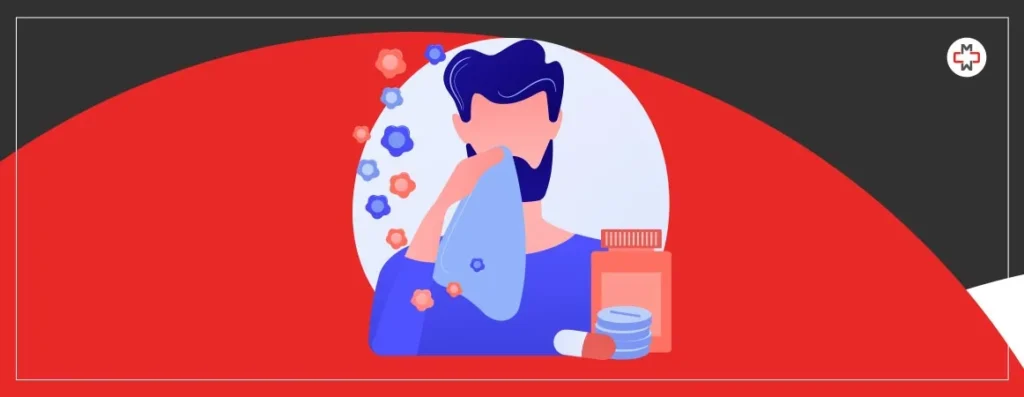With spring being right around the corner, pollen and soil mold are eminently common these days. The pollen in the air tends to cause seasonal allergies. Allergies vary in terms of severity from person to person. Not everyone reacts to it as severely and most people are only allergic to some specific types of pollen.
The Coronavirus pandemic is still prevalent. Symptoms for seasonal allergies and COVID-19 are quite similar and with people being in constant fear of being exposed to the virus, they tend to confuse the symptoms of common cold and allergies with COVID-19. To understand the difference we first need to understand what they are.
What is COVID-19?
COVID-19 is a respiratory disease caused by a new strain of coronavirus. It was first identified in December 2019 in Wuhan, China. Most people affected by the virus will experience mild to moderate respiratory symptoms which might not need immediate medical attention. Whilst the virus is said to have a much severe effect on old aged people and people who have underlying medical conditions like cancer, diabetes, or cardiovascular problems. The virus normally causes upper respiratory symptoms like shortness of breath or sore throat.
How does it spread?
COVID-19 spreads mainly through close contact between people like being physically near someone (within less than 6 feet). People who are infected but aren’t showing symptoms, known as the asymptomatic infection, can also spread the virus to others. How easily the virus spreads from person to person varies. The coronavirus tends to spread more easily than influenza but is not as transmittable as measles.
It spreads through the droplets of saliva and discharges from the nose when the person who’s infected sneezes or coughs.
How to prevent the spread of COVID-19?
There are a few steps recommended by the Centers for Disease Control and Prevention (CDC) and the World Health Organization (WHO). These steps can prevent the spread of the Coronavirus.
1) Wear a mask that covers your nose and mouth
2) Maintain your distance. Try to stay 6 feet apart from the people you don’t live with
3) Wash your hands for 20 seconds as often as possible
4) Use a sanitizer with at least 60% of alcohol after coughing, sneezing, or touching something.
5) Try to stay home and only go out if absolutely necessary
6) Avoid large gatherings
7) Disinfect objects that you frequently touch like your mobile phones and laptops.
8) Seek medical attention if you suspect your symptoms are worsening.
Besides these precautionary measures, it is very important to be informed. Get tested if you suspect that you may have contracted the coronavirus. Be aware of the latest findings of the virus and its vaccine.
Is it a seasonal allergy or Coronavirus?
In both cases, the respiratory system is affected which means the lungs and throat are infected. Some symptoms may be common for both but you can distinguish the two apart as the coronavirus causes some significant effects on your body.
| SYMPTOMS | COVID-19 | ALLERGIES |
|---|---|---|
| Fever or chills | Present | Absent |
| Cough | Present | Present |
| Fatigue | Present | Present |
| Headaches | Present | Present |
| Sore Throat | Present | Present |
| Runny and Stuffy Nose | Present | Present |
| Shortness of Breath | Present | Absent |
| Body Aches | Present | Absent |
| Loss of Taste and Smell | Present | Absent |
| Sneezing | Absent | Present |
| Itchy and Watery Eyes | Absent | Present |
| Nausea | Present | Absent |
| Diarrhea | Present | Absent |
Coronavirus vs. Allergy
Coronavirus has existed for over a year now. As for seasonal allergies they tend to happen every year before the arrival of spring. Some symptoms for both conditions might be similar. Although fever and shortness of breath are mostly associated with COVID-19, while allergies mostly affect the upper respiratory system which causes a runny nose, itchy and watery eyes, and sneezing.
The symptoms of seasonal allergies tend to get worse when an individual is outside in open air. As for COVID-19, there is a steady worsening of symptoms.
Final Word
It can be exhausting to keep up with the health conditions associated with the changing weather and ongoing prevalence of COVID-19. While there are some distinguishing factors between the two, it is better to be informed and aware.
Manhattan Medical Arts offers a couple of COVID-19 tests including the COVID-19 Rapid Testing and PCR Testing. Get tested so that you can make informed decisions about your healthcare.
– Disclaimer –
This blog is for informational & educational purposes only, and does not intend to substitute any professional medical advice or consultation. For any health related concerns, please consult with your physician, or call 911.
-
About The Author
Dr. Syra Hanif M.D.Board Certified Primary Care Physician
Dr. Syra Hanif is a board-certified Primary Care Physician (PCP) dedicated to providing compassionate, patient-centered healthcare.
Read More







